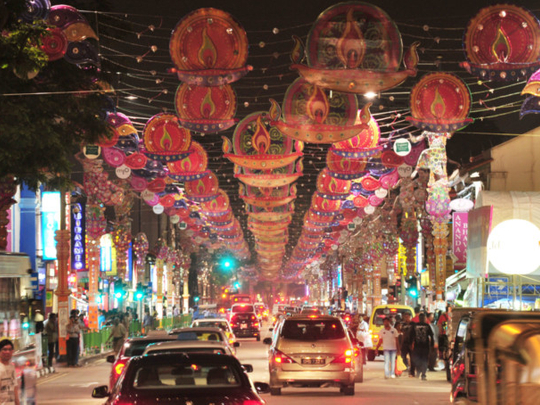
As Indians have spread across the world, so too has Indian culture. This is nowhere more evident than at Diwali, to be celebrated on Sunday, with the Indian diaspora using the Festival of Lights to share their traditions.
“Diwali connects me to my family back home,” says Pratyush Sarup, a Dubai-based interior designer. “I celebrate my culture and upbringing like I know they’re celebrating in Delhi.
“I make the same dishes Mum’s making. I also do up the house with lights, colours and flowers, and invite a group of friends from different nationalities and cultures for dinner,” says Sarup. “I’m not big on rituals, but I set up an altar where my guests and I can say a prayer.”
One festival, many customs
Anila Jairam, a third-generation South African Indian, says the country lives up to its moniker of the Rainbow Nation, with the broader community in Durban also getting involved in the festival. “There are huge events on the seafront, with people from all faiths and races participating in the cultural programmes.”
She says the best part is seeing her children. “My four sons, two daughters and eight grandchildren come home. Having everyone together warms a mother’s heart.”
Further north, the same sentiment exists. “Growing up in Bulawayo, Zimbabwe, Diwali meant community functions and new clothes for New Year,” reminisces Kalpesh Bhakta Hemant, a Gujarati Hindu. “We went visiting friends over a number of weeks.
“Diwali serves as a reminder that there is light and enlightenment at the end of any tunnel. It is also a time of family bonding, and when I moved to London, I’d celebrate with Mum’s family. We’d help the kids make rangoli designs and rush to get everyone dressed for the early prayers. There would be a havan and get-togethers with relatives.
“By lunchtime, plans were made to visit Neasden temple to see the mind-boggling Annakut display,” says Hemant. The diya decorations and public fireworks there are also a popular attraction.
“Since moving to Vancouver, Canada, my Diwali celebrations are alone and subdued, but I try to light the lamps like we did as kids in Bulawayo. And I have a special meal on both days,” he says. “All home-made, of course.”
Manali Yadav — “a typical desi from Mumbai” — says she used to look forward to the festival all year. “I try my best to follow my Mum’s pattern of cleaning the house, visiting temple, doing Lakshmi pooja, making sweets and putting up rangoli and diyas. In London, a visit to Trafalgar Square is must, where they have amazing celebrations. It is lovely to see that even British people enjoy and participate in Diwali.”
Over in Toronto, newlywed Sanjay Khanwani is looking forward to his first Diwali with his wife. “I love the home-made sweets,” he says. “But my favourite part is the fireworks. At some point, it becomes a competition in the neighbourhood of who can burst the loudest and brightest crackers.”
On how his celebrations have evolved, he says, “Here in Toronto, we cannot light fireworks at home, so people gather at big temples and celebrate together, whereas in Pakistan we would mostly celebrate in our neighbourhoods.”
Jitin L. Somaya has been in the US for more than a decade and lives in Norwalk, Connecticut, with his wife and two sons. “We do not celebrate for religious reasons but to honour our rich culture and traditions and to instil these values in our children.
“Festivals such as Diwali add colour to our lives, especially living in the West, away from our homeland, our families and our people.”
On the Caribbean island of Trinidad and Tobago, not much has changed, says Immanuel Azaad Moonesar. “The celebrations have remained the same, just like I remember as a child.
“We still celebrate as a family — cooking together, sharing secret recipes and praying. And then my favourite part — lighting the diyas at sunset.”
Beacons of light and hope
As Singapore’s third-largest ethnic group, Indians account for 9 per cent of the country’s population. “Diwali for me brings a lot of nostalgia, especially now that I live away from my family,” says Rahul Nagadia, who moved there ten years ago. “Diwali is a public holiday and Singapore has a unique concept of open house — an open invitation to all your relatives, friends, colleagues and their families to visit your home.
“At night, the streets of Little India are lit up with colourful lights and decorations and there are countdown concerts all over.”
Usha Devi K. Sabanayagam, a third-generation Malaysian, says, “In my youth, it was more about merrymaking and fun. As I got older, the celebration took on a more religious aspect.
“Diwali is recognised as a public holiday in most states and is considered the most significant Hindu celebration. In Kuala Lumpur, the streets of Jalan Tengku Kelana, Brickfields [also called Little India] and Leboh Ampang come alive in a myriad of colours,” she says.
In Frisco, Texas, in the US, Anisha Gupta loves Diwali’s ubiquitous socialising. “There’s lots of dancing.
“When I was a kid, my friends used to joke about my parents putting on the Christmas lights early,” she laughs.












